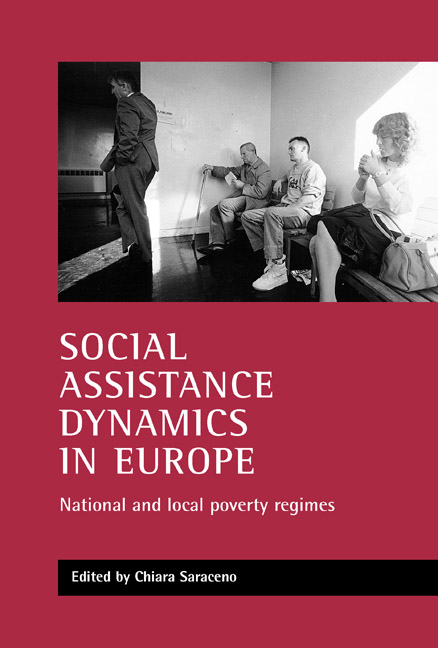Book contents
- Frontmatter
- Contents
- List of figures and tables
- Acknowledgements
- Notes on contributors
- one Introduction: exploring social assistance dynamics
- two Cities as local systems
- three Income support measures for the poor in European cities
- four Why some people are more likely to be on social assistance than others
- five Paths through (and out of) social assistance
- six Deconstructing the myth of welfare dependence
- References
- Appendix Institutional frameworks of income support policies in 13 European cities
- Index
six - Deconstructing the myth of welfare dependence
Published online by Cambridge University Press: 20 January 2022
- Frontmatter
- Contents
- List of figures and tables
- Acknowledgements
- Notes on contributors
- one Introduction: exploring social assistance dynamics
- two Cities as local systems
- three Income support measures for the poor in European cities
- four Why some people are more likely to be on social assistance than others
- five Paths through (and out of) social assistance
- six Deconstructing the myth of welfare dependence
- References
- Appendix Institutional frameworks of income support policies in 13 European cities
- Index
Summary
Social assistance in the face of changing demands for Support
Long-term unemployment among adults, delays and constraints in entering the labour market among the young, impoverishment of women and children due to the gender division of labour, as well as growing marital instability and the weakening of father-child ties, are all phenomena that challenge the traditional solutions offered by social assistance. In countries where income support measures in the form of a basic or minimum living allowance have been developed as a temporary stopgap for those who have lost the social security protection linked to their status as workers, changes in the labour market conditions and in life course patterns are transforming both the type of beneficiary and their experience. Together with the growing number of unemployed people who now have less opportunity of finding a new job due to age or lack of required skills, and the growing number of young people who have difficulty even entering the social security protected labour market, there is also a growing number of people who find themselves with little or no income or social security protection for reasons not directly linked to the labour market. Among these are unmarried, separated or divorced women with small children who invested in raising a family rather than in paid work, young people who have adopted self-destructive behaviour, families who are over-strained by the long illness of one of their members, and immigrants who encounter obstacles in their efforts at social integration and social mobility.
Income support may thus be received by populations who are dishomogeneous not only with regard to their life course, needs and personal resources, but also with regard to the perception of their situation, as well as the strategies developed. There may be individuals and groups who are ashamed to resort to social assistance and who ask for help only when they have exhausted or severely weakened their own and their social network’s resources. In contrast, other individuals and groups develop great skill and ingenuity in trying to get hold of some kind of entitlement to social assistance. Together with those who mix dependency on social assistance with more or less formal work activities and income, and those who use social assistance as a temporary measure while they look for a job, there are those who use social assistance as a substitute for searching for a low paid job.
- Type
- Chapter
- Information
- Social Assistance Dynamics in EuropeNational and Local Poverty Regimes, pp. 235 - 258Publisher: Bristol University PressPrint publication year: 2002



